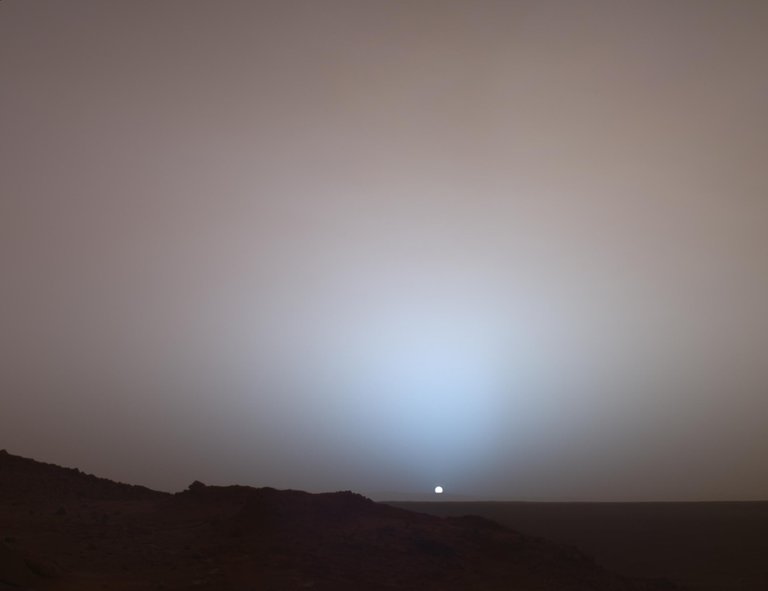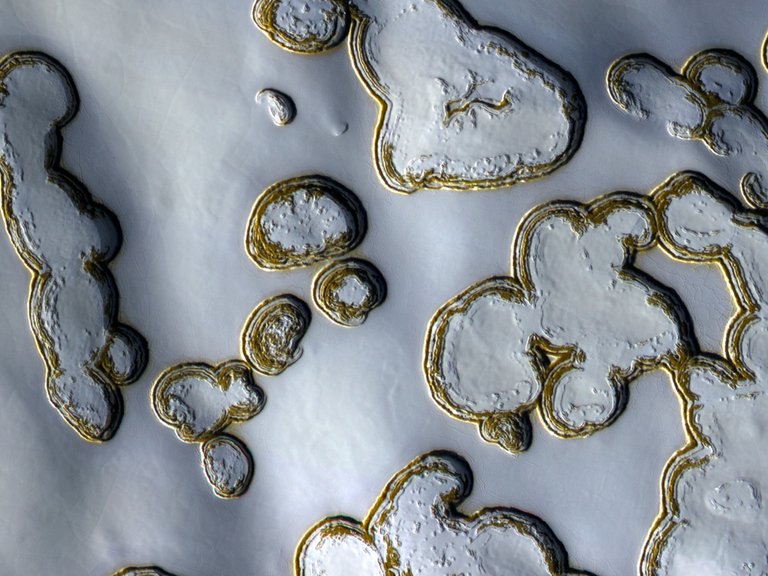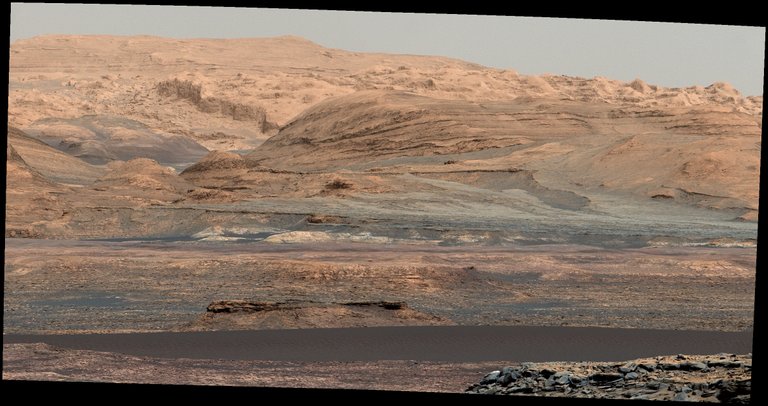Destination : Mars

A Martian Sunset
Mars, this arid frigid desert world, which has its surface regularly sculpted from raging blood red sandstorms, which harbors the tallest mountain in our solar system and is scarred with the deepest and longest canyons, has excited earth's denizens curiosity for centuries. Scientists believe, based on in situ observations of their stalwart robotic explorers, that a few billion years ago liquid water pooled on its surface, forming mighty rivers and spectacular lakes and where water interacts with minerals and is supplied with some form of energy for example our star's, life like here on Earth, could gloriously emerge.
.jpg)
Erosion by Scarp Retreat in Gale Crater
Yet the Sun, whose light bathes even the deepest reaches of its dominion, is both a bringer of life and a harbinger of doom. He is the fuel that feeds the fire of growth and evolution here on our home planet, but he is also the bane that slowly, albeit steady, gnaws at the red planet stripping him from its atmosphere until, not so far in the future in cosmic terms, its faint pink skies will fade to nothing and surrender their place to the pitch black void. Earth is shielded from Sun's wrath because its boiling core projects an invisible magnetic field that deflects all harmful radiation, but Mars's decayed almost 4 billion years ago and thus fell prey to our star's catastrophic whims, unleashing an unstoppable avalanche of side effects.
.jpg)
Two Sizes of Ripples on Surface of Martian Sand Dune

Martian Valley(White Balanced)
The aerial mass that surrounds the red planet started to dissolve, defenseless to the constant battering of the solar wind, until it thinned so much that it couldn't allow liquid water to flow on its crust, evaporating it due to low pressure and thus abruptly halting whatever biological processes could be happening. The global temperature plummeted freezing the drying world and while here ,on our galactic home, we enjoy an average of approximately 14 degrees Celsius (57 Fahrenheit) ,our celestial neighbor at this moment stoically suffers at more or less -61 degrees Celsius(-81 Fahrenheit) making that wind blasted desert so cold, that even carbon dioxide solidifies on its poles. The landscape gradually transformed and became from a vibrant caring cradle that could shelter and nourish life, to a bleak barren wasteland hateful towards all aspects of biology...

Carbon Dioxide Ice in the Late Summer
Nevertheless, life can find refuge even in the darkest of the pits ,it can stubbornly endure against all odds and prevail, even when it is hidden from all sight, even when it is deep beneath the ground. Mars didn't become that desolate bitter desert, scorched from our benefactor's radiated touch, overnight. The process was dire and agonizing but also slow enough to give biological entities, if any, time to possibly adapt to the new environmental conditions and find sanctuary underground... For all we know ancient deep moist cave systems might adorn the land beneath the crimson terrain ,where one can allow his imagination to run wild..Besides scientists already debate on the possibility of a 19 km(12 mile) lake existing beneath the ice of the south pole, sending waves of excitement to astrobiologists around the world.

Glimpse of 'Bagnold Dunes' Edging Mount Sharp
We have a chance to answer one of the fundamental questions that define us as an intelligent form of life which is 'Are we alone in the universe?' and the opportunity arouses not in someplace far away in the vast and overwhelming cosmos but in a celestial body that is just next to ours. The implications of a possible discovery so near, will spread out to multiple facets of our life and affect many of them radically, because it will loudly state that alien biology is probably thriving in the universe...
To be continued...
Hello!
This post has been manually curated, resteemed
and gifted with some virtually delicious cake
from the @helpiecake curation team!
Much love to you from all of us at @helpie!
Keep up the great work!
Manually curated by @georgeboya.
@helpie is a Community Witness.
Such an interesting post, i learned a lot of new things and really enjoyed the dramatic narration:) Looking forward for the next chapter, i will share it on my twitter also:) #posh
Hi @georgeboya! I really appreciate your comments and your support. When I begun writing the article I had in mind a more scientific approach to the information delivered throught it, but I quickly changed my mind to a way of expression that is surely more fun to me. Maybe my enthusiasm about the cosmos played a role to that as @carlgnash said.
Good choice because you know how much we love your narrations:)
Congratulations @harrycane! You have completed the following achievement on the Steem blockchain and have been rewarded with new badge(s) :
You can view your badges on your Steem Board and compare to others on the Steem Ranking
If you no longer want to receive notifications, reply to this comment with the word
STOPVote for @Steemitboard as a witness to get one more award and increased upvotes!
Hi @harrycane nice to see you post again. I like your enthusiastic voice here.
Best practice on Steem is to source your images and primary references - just a friendly reminder :)
Cheers
Hi @carlgnash it nice to be back! Thanks for your comment and the remarks regarding the links. It seems I didn't remember very well how to put the sources to the pics... I edited the post and all of them are working now.
I think is partly in me too, i may have cofused him a bit,lol.
This post was shared in the Curation Collective Discord community for curators, and upvoted and resteemed by the @c-squared community account.
If you are a community leader and/or contest organizer, please join the Discord and let us know you if you would like to promote the posting of your community or contest.
@c-squared runs a community witness. Please consider using one of your witness votes on us here